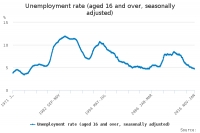Latest Stats March 2017: Labour Force Survey 3 Months to January 2017
Wednesday 15 March, 2017 Written by Simon Collyer ONS Labour Force Survey
ONS Labour Force Survey
Joblessness falls but wages decline also. Average weekly pay is now £507 according to the Office of National Statistics.
Estimates from the Labour Force Survey show that, between August to October 2016 and the 3 months to January 2017, the number of people in work increased, the number of unemployed people fell, and the number of people aged from 16 to 64 not working and not seeking or available to work (economically inactive) also fell.
There were 31.85 million people in work, 92,000 more than for August to October 2016 and 315,000 more than for a year earlier.
There were 23.34 million people working full-time, 305,000 more than for a year earlier. There were 8.52 million people working part-time, 10,000 more than for a year earlier.
The employment rate (the proportion of people aged from 16 to 64 who were in work) was 74.6%, the joint highest since comparable records began in 1971.
There were 1.58 million unemployed people (people not in work but seeking and available to work), 31,000 fewer than for August to October 2016 and 106,000 fewer than for a year earlier.
There were 867,000 unemployed men, 21,000 fewer than for August to October 2016 and 56,000 fewer than for a year earlier.
There were 717,000 unemployed women, 10,000 fewer than for August to October 2016 and 50,000 fewer than for a year earlier.
The unemployment rate was 4.7%, down from 5.1% for a year earlier. It has not been lower since June to August 1975. The unemployment rate is the proportion of the labour force (those in work plus those unemployed) that were unemployed.
There were 8.87 million people aged from 16 to 64 who were economically inactive (not working and not seeking or available to work), 34,000 fewer than for August to October 2016 and 59,000 fewer than for a year earlier.
The inactivity rate (the proportion of people aged from 16 to 64 who were economically inactive) was 21.6%, slightly lower than for August to October 2016 (21.7%) and lower than for a year earlier (21.8%).
Latest estimates show that average weekly earnings for employees in Great Britain in nominal terms (that is, not adjusted for price inflation) increased by 2.2% including bonuses, and by 2.3% excluding bonuses, compared with a year earlier.
1 comment
Leave a comment
Make sure you enter all the required information, indicated by an asterisk (*). HTML code is not allowed.
Join
FREE
Here










